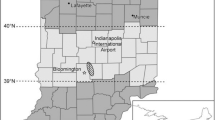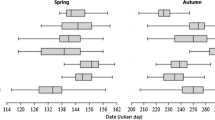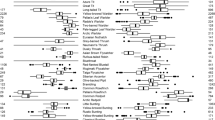Abstract
Climate warming causes the advancement of spring arrival of many migrant birds breeding in Europe, but the effects on their autumn migration are less known. We aimed to determine any changes in the timing of Song Thrush captured during spring and autumn migrations at the Polish Baltic coast from 1975 to 2014, and if these were related to long-term changes of temperature at their breeding grounds and migration routes. The timing of spring migration at Hel ringing station in 1975–2014 did not show long-term advance, but they had responded to environmental conditions on the year-to-year basis. The warmer the temperatures were in April on their migration route, the earlier were the dates of the median and the end of spring migration at Hel. The beginning of autumn migration at the Mierzeja Wiślana ringing station advanced by 5 days between 1975 and 2014. The warmer the April on route, and the July at the Song Thrushes’ breeding grounds, the earlier young birds began autumn migration across the Baltic coast. We suggest this was a combined effect of adults’ migration and breeding early during warm springs and young birds getting ready faster for autumn migration during warm summers. The average time span of 90% of the autumn migration was extended by 5 days, probably because of early migration of young birds from first broods and late of those from second broods enabled by warm springs and summers. The response of Song Thrushes’ migration timing to temperatures on route and at the breeding grounds indicated high plasticity in the species and suggested it might adapt well to climate changes.





Similar content being viewed by others
References
Ahola M, Laaksonen T, Sippola K, Eeva T, Rainio K, Lehikoinen E (2004) Variation in climate warming along the migration route uncouples arrival and breeding dates. Glob Chang Biol 10:1610–1617. https://doi.org/10.1111/j.1365-2486.2004.00823.x
Allison PD (1999) Multiple Regression: A Primer. Pine Forge Press, Thousand Oaks, p 142
Askeyev OV, Sparks TH, Askeyev IV, Tryjanowski P (2007) Is earlier spring migration of Tatarstan warblers expected under climate warming? Int J Biometeorol 51:459–463. https://doi.org/10.1007/s00484-007-0085-8
Berthold P (1998) Vogelwelt und Klima: Gegenwärtige Verwänderungen. Naturwissenschaftliche Rundschau 51:337–346
Berthold P (1996) Control of bird migration. Chapman & Hall, London
Both C, Bouwhuis S, Lessells CM, Visser ME (2006) Climate change and population declines in a long-distance migrant. Nature 441:81–83. https://doi.org/10.1038/nature04539
Briedis M, Hahn S, Adamík P (2017) Cold spell en route delays spring arrival and decreases apparent survival in a long-distance migratory songbird. BMC Ecol 17:11. https://doi.org/10.1186/s12898-017-0121-4
Busse P (2000) Bird Station manual. Southeast European bird migration network. University of Gdańsk, Choczewo
Busse P, Maksalon L (1986) Wędrówki europejskich populacji drozda śpiewaka Turdus philomelos. Notatki Ornitologiczne 27:1–2
Chodkiewicz T, Meissner W, Chylarecki P, Neubauer G, Sikora A, Pietrasz K, Cenian Z, Betleja J, Kajtoch Ł, Lenkiewicz W, Ławicki Ł, Rohde Z, Rubacha S, Smyk B, Wieloch M, Wylegała P, Zielińska M, Zieliński P (2016) Monitoring Ptaków Polski w latach 2015–2016. Biuletyn Monitoringu Przyrody 15:1–86
Clement P, Hathway R, Byers C, Wilczur J (2000) Thrushes. Christopher Helm Publishers Ltd, London
Cotton PA (2003) Avian migration phenology and global climate change. PNAS 100:12219–12222. https://doi.org/10.1073/pnas.1930548100
Cramp S (ed) (1988) The birds of the Western Palearctic. Vol V. Oxford University Press, Oxford, pp 989–1000
Crawley MJ (2013) The R book, 2nd edn. John Wiley & Sons, Ltd, Hoboken, pp 586–588
Crick HQP, Sparks TH (1999) Climate change related to egg-laying trends. Nature 399:423. https://doi.org/10.1038/20839
Demongin L (2016) Identification guide to birds in the hand. Beauregard-Vendon, pp 266
Dunn P (2004) Breeding dates and reproductive performance. Adv Ecol Res 35:67–86. https://doi.org/10.1016/S0065-2504(04)35004-X
Ehnbom S, Karlsson L, Ylvén R, Åkesson S (1993) A comparison of autumn migration strategies in Robins Erithacus rubecula at a coastal and an inland site in southern Sweden. Ringing Migr 14:84–93. https://doi.org/10.1080/03078698.1993.9674049
Elkins N (2004) Weather and bird behavior. T&A D Poyser, London
European Climate Assesment and Dataset (2015) Daily mean and minimum temperatures: http://eca.knmi.nl/dailydata/predefinedseries.php. Accessed 15 Aug 2015
Forchhammer MC, Post E, Stenseth NC (2002) North Atlantic oscillation timing of long- and short-distance migration. J Anim Ecol 71:1002–1014. https://doi.org/10.1046/j.1365-2656.2002.00664.x
Fox J, Weisberg S (2011) An R companion to applied regression, 2nd edn. Sage, Thousand Oaks
Fransson T, Hall-Karlsson S (2008) Svensk ringmärkningsatlas. Vol. 3. Stockholm, pp 85–90
Gordo O (2007) Why are bird migration dates shifting? A review of weather and climate effects on avian migratory phenology. Clim Res 35:37–58. https://doi.org/10.3354/cr00713
Gordo O, Tryjanowski P, Kosicki JZ, Fulín M (2013) Complex phenological changes and their consequences in the breeding success of a migratory bird, the white stork Ciconia ciconia. J Anim Ecol 82:1072–1086. https://doi.org/10.1111/1365-2656.12084
Harvard University Center for the Environment (HUCE) (2013) Extreme weather & climate change. HUCE Newsletter 5:18–21
Hastie TJ, Tibshirani RJ (1990) Generalized additive models. Chapman and Hall, London
Howell DC (2015) Randomization Test on Two Independent Samples. https://www.uvm.edu/~dhowell/StatPages/Randomization%20Tests/Random2Sample/twoindependentsamples.html. Accessed 16 June 2016
Huin N, Sparks TH (2000) Spring arrival patterns of the Cuckoo Cuculus canorus, nightingale Luscinia megarhynchos and spotted flycatcher Muscicapa striata in Britain. Bird Study 47:22–31. https://doi.org/10.1080/00063650009461157
Hüppop O, Hüppop K (2003) North Atlantic oscillation and timing of spring migration in birds. Proc R Soc Lond B 270:233–240. https://doi.org/10.1098/rspb.2002.2236
Knudsen E, Lindén A, Both C, Jonzén N, Pulido F, Saino N, Sutherland WJ, Bach LA, Coppack T, Ergon T, Gienapp P, Gill JA, Gordo O, Hedenström A, Lehikoinen E, Marra PP, Møller AP, Nilsson ALK, Péron G, Ranta E, Rubolini D, Sparks TH, Spina F, Studds CE, Sæther SA, Tryjanowski P, Stenseth NC (2011) Challenging claims in the study of migratory birds and climate change. Biol Rev 86:928–946. https://doi.org/10.1111/j.1469-185X.2011.00179.x
Kokko H (1999) Competition for early arrival in migratory birds. J Anim Ecol 68:940–950. https://doi.org/10.1046/j.1365-2656.1999.00343.x
Lack D (1972) Ecological adaptations for breeding in birds. Chapman and Hall, London
Lehikoinen E, Sparks TH (2010) Changes in migration. In: Møller AP, Fiedler W, Berthold P (eds) Effects of Climate Change on Birds. Oxford University Press, Oxford, pp 89–112
Manly BFJ (2007) Randomization, bootstrap, and Monte Carlo methods in biology, 3rd edn. Chapman & Hall, London, pp 64–65
Marra PP, Francis CM, Mulvihill RS, Moore FR (2005) The influence of climate on the timing and rate of spring bird migration. Oecologia 142:307–315. https://doi.org/10.1007/s00442-004-1725-x
Menzel A, Sparks TH, Estrella N, Koch E, Aasa A, Ahas R, Alm-Kübler K, Bissolli P, Braslavská O, Briede A, Chmielewski FM, Crepinsek Z, Curnel Y, Dahl Å, Defila C, Donnelly A, Filella Y, Jatczak K, Måge F, Mestre A, Nordli Ø, Peñuelas J, Pirinen P, Remišová V, Scheifinger H, Striz M, Susnik A, Van Vliet AJH, Wielgolaski F-E, Zach S, Zust ANA (2006) European phenological response to climate change matches the warming pattern. Glob Chang Biol 12:1969–1976. https://doi.org/10.1111/j.1365-2486.2006.01193.x
Miller-Rushing AJ, Lloyd-Evans TL, Primack RB, Satzinger P (2008) Bird migration times, climate change, and changing population sizes. Glob Chang Biol 14:1959–1972. https://doi.org/10.1111/j.1365-2486.2008.01619.x
Milwright RDP (2006) Post-breeding dispersal, breeding site fidelity and migration/wintering areas of migratory populations of Song Thrush Turdus philomelos in the Western Palearctic. Ringing Migr 23:21–32. https://doi.org/10.1080/03078698.2006.9674340
Mitrus C, Sparks TH, Tryjanowski P (2005) First evidence of phenological change in a transcontinental migrant overwintering in the Indian sub-continent: the red-breasted flycatcher Ficedula parva. Orn Fenn 82:13–19
Møller AP, Fiedler W, Berthold P (2010) Introduction. In: Møller AP, Fiedler W, Berthold P (eds) Effects of climate change on birds. Oxford University Press, Oxford, pp 3–5
Moritz D (1993) Long-term monitoring of Palearctic-African migrants at Helgoland (German Bight, North Sea). Ann Sei Zool 268:579–586
Nowakowski JK, Remisiewicz M, Keller M, Busse P, Rowiński P (2005) Synchronisation of the autumn mass migration of passerines: a case of Robins Erithacus rubecula. Acta Ornithol 40:103–115. https://doi.org/10.3161/068.040.0206
Payevsky VA (1998) Age structure of passerine migrants at the eastern Baltic coast: the analysis of the “coastal effect”. Ornis Svecica 8:171–178
Portal of Finnish bird ringing services and bird monitoring. (2017). https://rengastus.helsinki.fi/tuloksia/Pistelaskenta/tilasto/TURPHI Accessed 15 July 2017
R Core Team (2016) R: a language and environment for statistical computing. R Foundation for Statistical Computing,Vienna, Austria. https://www.R-project.org
Rainio K, Tøttrup AP, Lehikoinen E, Coppack T (2007) Effects of climate change on the degree of protandry in migratory songbirds. Clim Res 35:107–114. https://doi.org/10.3354/cr00717
Remisiewicz M, Tree AJ, Underhill LG, Burman MS (2017) Age-specific variation in relationship between moult and pre-migratory fuelling in Wood Sandpipers Tringa glareola in southern Africa. Ibis 159:91–102. https://doi.org/10.1111/ibi.12436
Rubolini D, Spina F, Saino N (2004) Protandry and sexual dimorphism in trans-Saharan migratory birds. Behav Ecol 15:592–601. https://doi.org/10.1093/beheco/arh048
Sinelschikova A, Sokolov LV (2004) Long-term monitoring of the timing of migration in thrushes (Turdus philomelos , T. iliacus) in the Eastern Baltic. Avian Ecol Behav 12:11–30
Sokolov LV, Markovets MY, Shapoval AP, Morozov YG (1998) Long-term trends in the timing of spring migration of passerines on the Courish Spit of the Baltic Sea. Avian Ecology and Behavior 1:1–21
Sparks TH, Tryjanowski P (2005) The detection of climate impacts: some methodological considerations. Int J Climatol 25:271–277. https://doi.org/10.1002/joc.1136
Sparks TH, Tryjanowski P (2007) Patterns of spring arrival dates differ in two hirundines. Clim Res 35:159–164. https://doi.org/10.3354/cr00722
Svensson L (1992) Identification guide to European passerines, British Trust for Ornithology, The Nunnery, pp 152–153
Tøttrup AP, Thorup K, Rahbek C (2006a) Patterns of change in timing of spring migration in North European songbird populations. J Avian Biol 37:84–92. https://doi.org/10.1111/j.0908-8857.2006.03391.x
Tøttrup AP, Thorup K, Rahbek C (2006b) Changes in timing of autumn migration in North European songbird populations. Ardea 94:527–536
Tryjanowski P, Kuźniak S, Sparks TH (2002) Earlier arrival of some farmland migrants in western Poland. Ibis 144:62–68. https://doi.org/10.1046/j.0019-1019.2001.00022.x
Valkama J, Saurola P, Lehikoinen A, Lehikoinen E, Piha M, Sola P, Velmala W (2014) The Finnish Bird Ringing Atlas. Vol II. Finnish Museum of Natural History and Ministry of Environment, Helsinki, pp 445–450
Venables WN, Ripley BD (2002) Modern applied statistics with S, 4th end edn. Springer, New York
Wood S (2017a) Generalized additive models: an introduction with R, 2nd edn. Chapman & Hall. CRC Press, Taylor & Francis Group, Florida
Wood S (2017b) Package ‘mgcv’. https://cran.r-project.org/package=mgcv
Zar JH (2010) Biostatistical analysis, 5th edn. Pearson Prentice Hall, New Jersey, pp 400–402
Acknowledgements
We are grateful to Marc Burman for advice on statistic procedures. We are grateful to Joel Avni for valuable comments and editing. We are grateful to the Editor and three anonymous reviewers for helpful comments to the earlier version of the paper.
Funding
This paper was supported by the research grant from the National Research Foundation (NRF) in South Africa and the National Centre for Research and Development (NCBiR) in Poland, within the Poland-South Africa Agreement in Science and Technology (PL-RPA/BEW/01/2016). The field data used in this study was collected with the support of the grants from the Polish Ministry of Higher Education to the Bird Migration Research Station (SPUB).
Author information
Authors and Affiliations
Corresponding author
Electronic supplementary material
ESM 1
(DOCX 19 kb)
Rights and permissions
About this article
Cite this article
Redlisiak, M., Remisiewicz, M. & Nowakowski, J.K. Long-term changes in migration timing of Song Thrush Turdus philomelos at the southern Baltic coast in response to temperatures on route and at breeding grounds. Int J Biometeorol 62, 1595–1605 (2018). https://doi.org/10.1007/s00484-018-1559-6
Received:
Revised:
Accepted:
Published:
Issue Date:
DOI: https://doi.org/10.1007/s00484-018-1559-6




